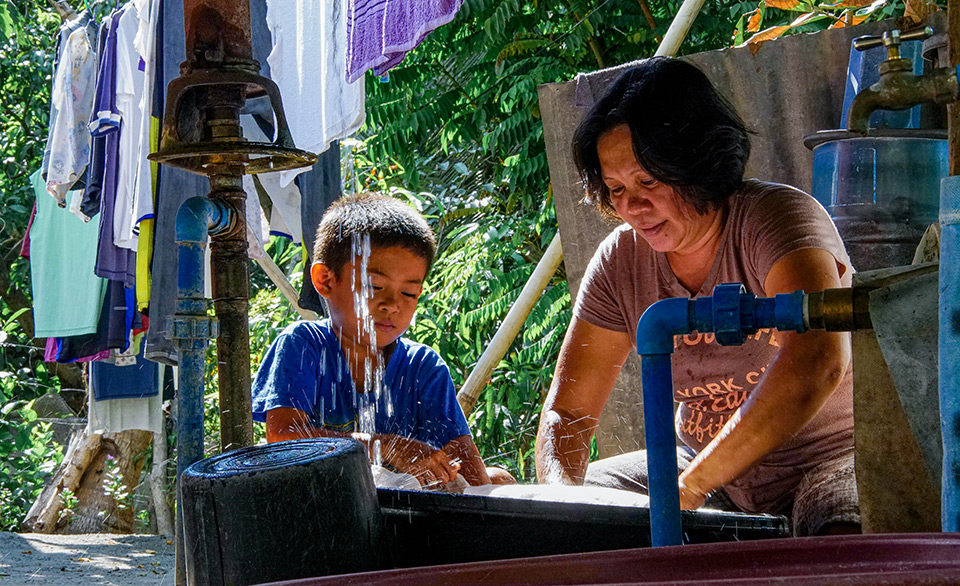Why women in the Bangsamoro are essential to keep the peace, and to tackle COVID-19
Date:
Author: Riza Torrado, UN Women Philippines

A little more than a year after its creation, the Bangsamoro Autonomous Region in Muslim Mindanao (BARMM) is facing its latest threat to peace and security: the COVID-19 pandemic. Grievances associated with the pandemic, including inequitable access to healthcare and social support, are fueling community tensions, driving discrimination and hate speech, and reigniting violent conflict between clans and with government forces.
As the fabric of social cohesion starts to unravel, now more than ever, the work of women peacebuilders in the BARMM is crucial for repairing social breakdowns, sustaining peace, and building gender-inclusive COVID-19 recovery in support of a stable future for the region.
The COVID-19 pandemic is acting as a driver of conflict in the BARMM, placing further pressure on communities already vulnerable due to relentless cycles of war, poverty, failed governance, and natural disasters. In particular, the vulnerabilities of women and girls in the BARMM have been exacerbated by the COVID-19 pandemic with increases in family violence, loss of livelihoods, and increases in unpaid care work. Internally displaced women and girls living in temporary evacuation centers face even greater risks, as access to government assistance and essential services are hampered by border controls and armed attacks against workers delivering assistance.
As resilience reaches breaking point, the COVID-19 pandemic risks undermining advancements in gender equality and the rights of women and girls in BARMM, as well as confidence in the region’s transition, nascent institutions, and upcoming elections in 2022. Patterns of intra-communal violence, violence against women, attacks and discrimination against healthcare workers and people suspected of contracting COVID-19, discontent over allegations of corruption, and the growing disenfranchisement of those who have lost their livelihoods, are all early warnings signs that peace and stability are under threat in the region.
While great strides have been made in the short period since the establishment of BARMM, including the adoption of The Bangsamoro Transition Act 34 of January 2020, and the subsequent establishment of a regional machinery on women – the Bangsamoro Women’s Commission (BWC) – it is crucial that women’s peacebuilding expertise and participation in decision-making are not overlooked amidst competing priorities. Building on the work of women peacebuilders and civil society, as well as the Bangsamoro Transition Authority, BWC, and others, consistent efforts must be made to further support the participation of women to ensure important advancements, such as the Regional Action Plan on Women, Peace and Security, and the enhanced Gender and Development Code, are not lost.
At present, there are two women heads at the executive branch of the fifteen ministries, while 16 of 98 seats in parliament are held by women. This is below the recommended 30 per cent representation of women for meaningful influence, and well below gender parity. In addition, legislative, policy and programmatic agendas of BARMM governance institutions are not yet reflective of the needs and priorities of diverse groups of women and girls. Women’s voices and leadership from the community level up are needed to inform these agendas and actions.
“Women [are] partners in what we want to achieve in life. For women, fight for yourselves, know your rights and your duties.” - Bangsamoro Woman, Faces of Bangsa, UN Women and the Moropreneur Inc, 16 June 2020
Women’s participation is further crucial to building communities that are resilient to radicalization and to support community members to rejected recruitment by armed groups. As seen in previous conflicts in the Philippines, disenfranchisement and geographic isolation have been used by non-state actors to recruit for armed movements.
Addressing the regional Parliament on 23 July 2020, BWC Chair and Member of Parliament, Hja. Bainon Karon, emphasized the need for a gender-sensitive approach to COVID-19 response in order to strengthen peace in the region. MP Karon urged the BARMM Regional Government to ensure that all interventions in the context of the COVID-19 pandemic are culturally sensitive and are contributing towards women’s empowerment and gender equality. Amongst the key actions to be undertaken, she called for BARMM actors to collect and analyse sex-disaggregated data as a basis for designing policies and programmes for recovery; to ensure inclusive processes by engaging women in COVID-19 interventions to engage their potential beyond their role as home managers; to empower women to use ICT technology for greater access to life-saving information and resources and dissipating hate messages and tensions at the community level; and to set-up women’s desks alongside COVID-19 testing centers to facilitate reporting and access to support systems.
In support of these calls, UN Women is stepping up to meet the peace and security challenges facing the region. With support from the Government of Norway, UN Women is working with partners, including women peacebuilders, women civil society leaders, Moro and Indigenous women, BWC, and others, to deliver a rapid response approach to mitigating the peace and security impacts of COVID-19 and promoting gender-inclusive recovery and social cohesion, as the region undergoes this critical juncture towards its transition.
Time and time again, Bangsamoro women have played indispensable roles in resolving conflict and building peace in the BARMM. From the landmark Comprehensive Agreement on the Bangsamoro (2014), to the halls of legislature advocating for gender equality in the Bangsamoro Organic Law, and in the communities educating men, women, boys and girls on the importance of the rights of women and girls, peace and stability in the BARMM long bares the fingerprints of Bangsamoro women, and it is vital that women are able to meaningfully shape the region going forward if peace is to be durable and sustainable.
The programme ”Women Sustain the Peace during COVID-19 in the Philippines” is implemented in the BARMM, from 1 June to 31 December 2020, with the generous support of the Government of Norway.